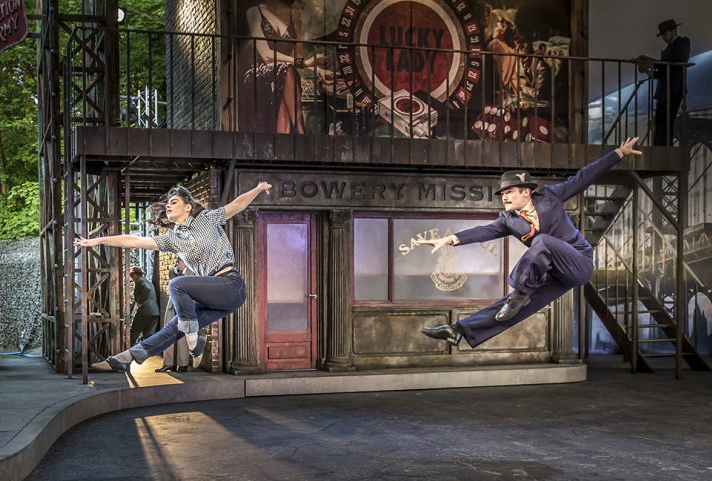As the easing of a full five month lockdown looks likely to partially re-opens British theatre (and society) after more than a year overall, with only brief respites of activity in-between three shutdowns, I am this week celebrating the imminent return of live performances to British theatres by turning my focus onto my ShenTens favourite regional theatre venues.
LISTEN HERE:
Living, as I currently do, at what is traditionally regarded as the epicentre of British theatre, namely London, it would be extremely easy to get one’s fill of theatre in my own postcode of SE1, plus the adjoining ones of W1 and WC2, with an occasional foray to N1, NW3, or W6. And some critics do indeed remain resolutely London-centric.
But even though I can easily walk to Southwark Playhouse or the Menier — just down the street from my flat, or around the corner from it, respectively — with the Union, Young Vic, Old Vic, Bridge, Unicorn and National not too much further away, I love both the sense of occasion, engagement and surprise that often awaits me at some of our leading regional theatres.
Some of them I’ve visited again and again over the years; others I’m always determined to get to more, and certainly once this pandemic is finally over, I plan to make good on that promise to myself: not least because my husband and I are planning to relocate our main home beyond London.
Though we’ve not settled on a location just yet, I still hope and plan to be within reach of London for an overnight return at least once a week (so I can see three or four shows in two days, before returning home on the second day); but on other days, I hope to be within striking distance of a regional venue or two. Most of those on this list are still going to be too far away for an easy day trip, but Chichester, for example, is one area we’re considering, so that could become our new “local”.
All of these theatres are what are known as producing theatres, established mainly around originating their own productions, though some will occasionally host touring productions. Venues that exclusively programme touring shows but don’t produce their own shows are not included in this ShenTens – a future episode may feature these!
1 Sheffield’s Crucible Theatre
Though Sheffield’s Crucible Theatre may still be nationally best known not for its work as a major producing theatre but for playing host to the annual World Snooker Championships (which it has done since 1977 after originally opening in 1971), it has really come into its own in the last two decades as occupying the pole position in the premiere league of regional theatres.
Under successive artistic directors Michael Grandage, Sam West, Daniel Evans and now Rob Hastie — each of them, not coincidentally I imagine, actors-turned-directors — this thrust-stage theatre has become one of the most imaginative homes for new work as well as classic revivals of plays and musicals. With an audience of nearly 1000 people — all held in a warm embrace on one level but three sides around the stage — there’s an intimate feeling of connection from every seat to every other member of the audience: we’re all in this together.
I first visited this theatre in the 1980s to see the first live version of the Styne/Sondheim/Laurents classic Gypsy that I ever saw, starring Sheila Hancock as Momma Rose; in the years since, I’ve loved many classic musicals here, including Annie Get Your Gun (with an irresistible Anna-Jane Casey as Annie Oakley); My Fair Lady (with Dominic West — who hails from these parts — as Professor Higgins); Kiss Me, Kate and a gorgeous revival of Show Boat that subsequently transferred to the New London in 2015, earning an Olivier for one of my ShenTens favourite West End musical leading ladies Rebecca Trehearn.
But even more impressively, the Crucible has regularly championed new musicals, and has been particularly triumphant of course with Everybody’s Talking About Jamie, a brand-new show by a pop composer Dan Gillespie Sells (writing his first musical) that quickly transferred to the West End’s Apollo Theatre and had just launched a simultaneous national tour when the arrival of the pandemic shut both down. They will be back, though — and a new film version is due to be released imminently, too.
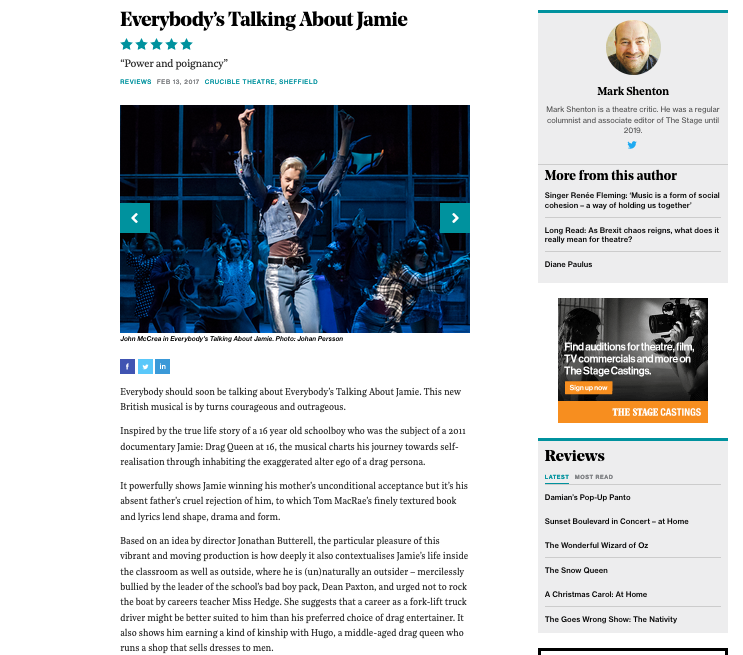
I’ll never forget the thrill of seeing the first night in Sheffield — I was straight off a plane from New York that morning, took the train to Sheffield, saw the show and rushed back to my hotel room directly after to write a review after the show that opened with the declaration, “Everybody should soon be talking about Everybody’s Talking About Jamie. This new British musical is by turns courageous and outrageous.”
The next morning I got calls from not one but two separate West End producers to ask me more; in fact it was another, Nica Burns, who ended up bringing it to town. She caught it on its final Saturday matinee, and immediately pitched to do so. I, meanwhile, had returned that Saturday evening to see it again — a real vote of confidence in a show I’d only just seen the week before!
CONTACTS
Website: https://www.sheffieldtheatres.co.uk/
Box Office: 0114 249 6000
Address: 56 Norfolk Street, Sheffield S1 1DA
Twitter: @crucibletheatre
2 Manchester’s Royal Exchange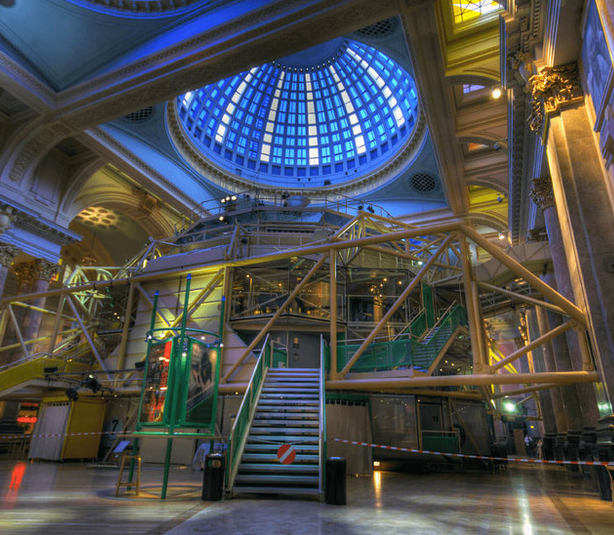
Arguably the city with the most thriving theatre culture outside London would be Manchester; and unarguably the crown jewel in that city’s cultural crown is the Royal Exchange, housed in a classic Victorian building that had once been used as a commodities exchange for cotton and textiles in the city’s industrial heyday, but since 1976 has been the home to Britain’s most impressive (and unusual) theatre in the round.
A glass capsule that looks like a lunar space craft that has somehow landed in the middle of the Great Hall, it seats up to 800 people on three levels, and has a sense of occasion as well as anticipation from the moment you enter the hall. That’s partly the physical space, but also the legacy of 45 years of theatre here that has nurtured incredible writers like the local Simon Stephens (who hails from Stockport and whose plays Port and On the Shore of the Wide World were premiered here before subsequently being seen at the National, and Punk Rock that would go on to a London run at the Lyric Hammersmith), actors (that have included such actors as Cush Jumbo and Maxine Peake); and directors that have included Marianne Elliot (whose father Michael was a founding artistic director here) and Matthew Xia.
Musicals don’t lend themselves easily to in-the-round presentation, but I’ve seen exhilarating versions of Into the Woods, Sweet Charity and West Side Story here.
Also in Manchester:
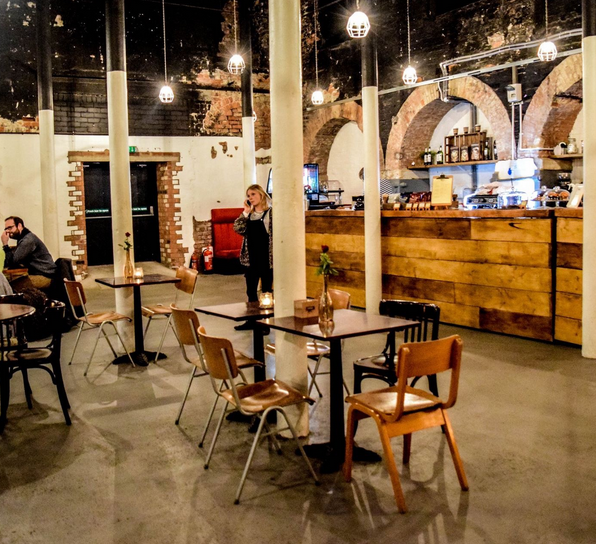

- I love the Hope Mill (the bar area of which is pictured above left), a professional studio theatre located in an industrial building in Ancoats, founded by two former actors Joseph Houston and William Whelton in 2015, and which has quickly gone from strength to strength, with shows like Hair, Pippin, Yank! and Rags transferring to runs in London. This Christmas, Matthew Xia will direct a new production here of the rarely-seen 1975 Broadway musical The Wiz (an African-American version of The Wizard of Oz story, running November 24-January 16).
- Manchester’s HOME (above right, exterior), a gorgeous new multi-disciplinary venue that includes spaces for exhibiting visual arts, live theatre performances and showing films, opened in 2015, merging the former Cornerhouse cinema and Library Theatre Company. I’ve not yet visited it enough to really enjoy it, though!
- The biennial Manchester International Festival, founded in 2007 and subsequently recurring every two years, is focused primarily on commissioning new work across genres and disciplines that frequently go onto a further life elsewhere, in partnership with the other organisations that work with them. These have included the world premieres of operas by Damon Albarn and Rufus Wainwright, performance art by Marina Abramović, a production of Shakespeare’s Macbeth that starred Kenneth Branagh, and a play called Tree that was billed as being created by Idris Elba and Kwame Kwei-Armah, whose original authors Tori Allen-Martin and Sarah Henley went uncredited. The MIF is due to soon have a permanent home in a new venue being built called the Factory, on the site of the former Granada TV studios.
CONTACTS
Royal Exchange Theatre
https://www.royalexchange.co.uk/
Box Office: 0161 833 9833
Address: St Ann’s Square, Manchester M2 7DH
Twitter: @rxtheatre
Hope Mill Theatre
https://hopemilltheatre.co.uk/
Box Office: 0161 275 9141
Address: 113 Pollard Street, Manchester M4 7JA
Twitter: @hopemilltheatr1
HOME
https://homemcr.org
Box Office: 0161 200 1500
Address: 2 Tony Wilson Place, Manchester, M15 4FN
Twitter: @HOME_mcr
Manchester International Festival
https://mif.co.uk/
Address: Blackfriars House, Parsonage, Manchester M3 2JA
Twitter: @MIFestival
3 Chichester Festival Theatre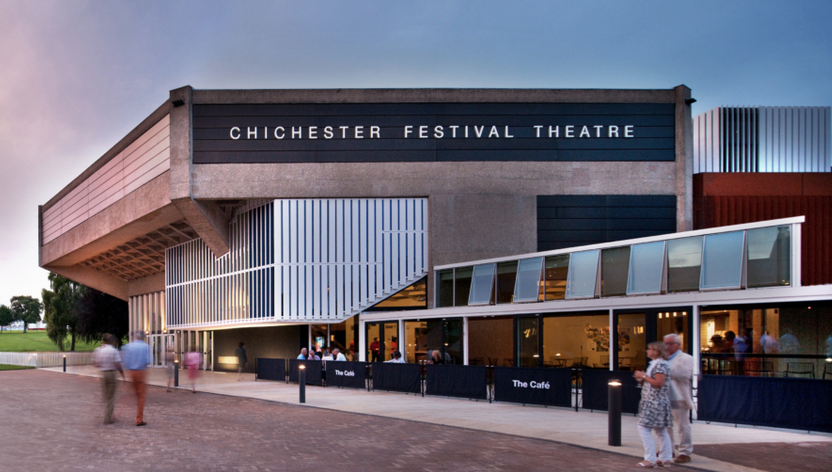
It was at Chichester Festival Theatre that what became the National Theatre first found its feet, with Laurence Olivier leading seasons here from 1962 that subsequently transferred to London’s Old Vic, a classic theatre that the company rented on the South Bank (until they finally opened their own purpose-built home on the Thames nearby in 1976).
The Festival theatre has always put the festive into festival, partly because the centrepiece of the operation has long been an annual extended summer season (that runs typically from March to October now), with touring shows filling the rest of the schedule. In 1989 the intimate studio Minerva Theatre was added, and is regularly home to new plays.
Under artistic directors like Patrick Garland and John Gale in the 1980s and early 1990s, the theatre forged strong relationships with West End producers that included Duncan C Weldon, turning the venue into a launch pad for subsequent London runs; Weldon himself would take the reigns of theatre for three seasons from 1995 to 1997. For the last decade and a half — first under Jonathan Church and since 2016 under Daniel Evans — the theatre has become a major originating theatre for new plays and revivals that regularly transfer to London.
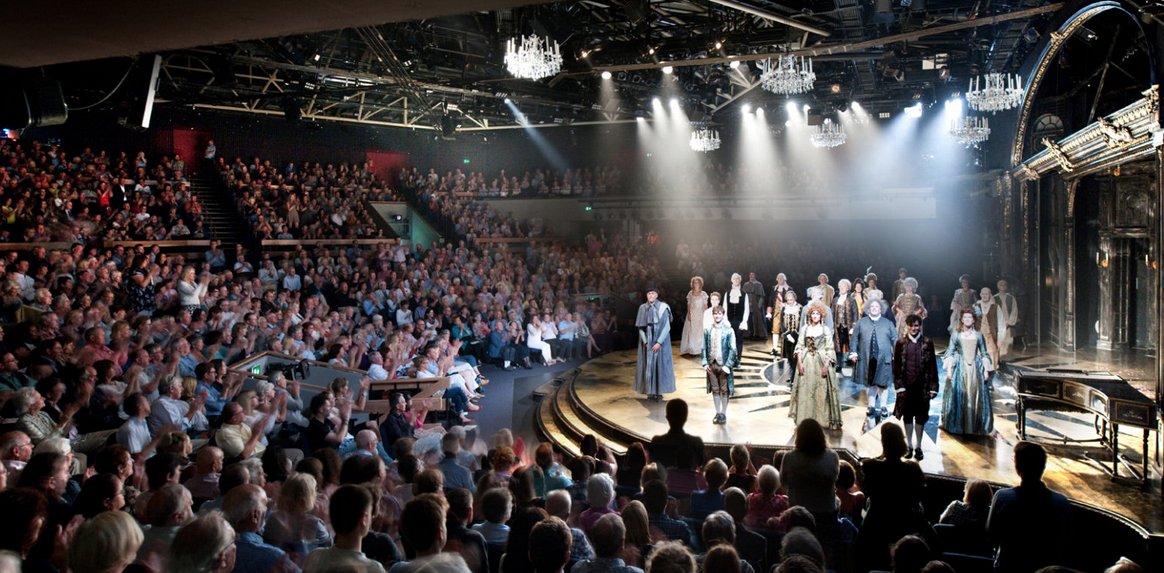
Since 2010, these transfers have included the plays Yes Prime Minister (based on the TV series of the same name), Lucy Prebble’s Enron, King Lear (with Ian McKellen in the title role), James Graham’s Quiz and a trilogy of Chekov plays, presented under the umbrella title Young Chekhov, that moved to the National Theatre; and musicals like Singin’ in the Rain (in a production that will be revived at Sadler’s Wells later this year), Sweeney Todd (with Olivier winners Michael Ball and Imelda Staunton), Guys and Dolls, Half a Sixpence and Caroline, or Change, all of which transferred to the West End , withe latter also due to go to Broadway last year, but thata was delayed by the pandemic.
A day out in Chichester is always a treat; now I’m thinking the Cathedral city could be home….
CONTACTS
https://www.cft.org.uk/
Box Office: 01243 781312
Address: Oaklands Park, Chichester, West Sussex PO19 6AP
Twitter: @ChichesterFT
4 Bristol Old Vic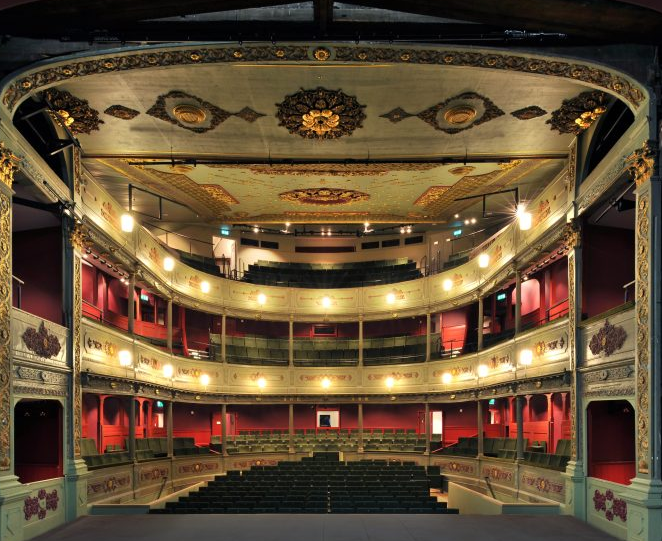
The oldest continually operating theatre in Britain, the Bristol Old Vic first opened in 1766; in May 2016, it celebrated its 250th anniversary. An extensive £19m refurbishment programme was completed in 2018. Since 2009, the theatre has been led by artistic director Tom Morris, who prior to taking this role was an associate director at the National Theatre where he co-directed War Horse.
His Bristol productions of Swallows and Amazons (featuring songs by the Divine Comedy’s Neil Hannon), The Grinning Man (a macabre new musical) and Touching the Void (based on the film of the same name) all transferred to the West End.
There are few more beautiful theatre in the UK than the Bristol Old Vic, and none quite so historic. Yet it is also now one of the most forward-thinking theatres in the country, too.
CONTACT: https://bristololdvic.org.uk/
Box Office: 0117 987 7877; Address: King Street, Bristol, BS1 4ED; Twitter: @BristolOldVic
5 Royal Shakespeare Theatre, Swan Theatre, The Other Place in Stratford-upon-Avon
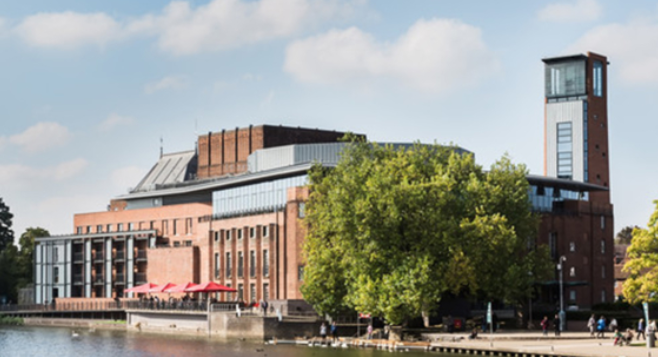
Stratford-upon-Avon is, of course, is a town indelibly associated with William Shakespeare, our national playwright who was both born and buried there. As you cross the borders into Warwickshire, you are greeted by signs welcoming you to Shakespeare country; and Stratford-upon-Avon has most of the historic sites associated with his life, from his school to his grave.
The Royal Shakespeare Company was founded in 1960, and based itself here, in what was originally called the Shakespeare Memorial Theatre, an imposing red-brick building on the banks of the Avon that courses through the town, that was the first major theatre designed by a woman architect in Britain, Elisabeth Scott and originally opened in 1932, after a fire destroyed a previous theatre on this site. It was renamed the Shakespeare Memorial Theatre in 1961; the RSC added both a studio theatre, the Other Place (in 1974) and the Swan (in 1986) to stage both new work and plays by Shakespeare’s contemporaries like John Fletcher and Christopher Marlowe.
The “Transformation project”, from 2007-2010, saw the RST closed and its work relocated to a new temporary theatre, the Courtyard, built on the site of the Other Palace just up the street; during the extensive refurbishment, a new rooftop bar and restaurant was added, and the theatre auditorium remodelled into a thrust stage configuration.
Shakespeare, of course, remains the core repertoire of the company; but it has also expanded its brief to include new musicals, like Tim Minchin and Dennis Kelly’s Matilda (that was launched here in the temporary Courtyard Theatre in 2010, before transferring to the West End and Broadway); and new plays by such playwrights as David Edgar, Edward Bond and Peter Flannery.
A regular visit to Stratford in an essential date in any Shakespearean lovers’ diary — but now there are many other venues that also produce his work regularly, like Shakespeare’s Globe in London. But in Stratford, he is truly ‘at home’; and the RSC is an integral part of that home.
CONTACTS
https://www.rsc.org.uk/
Box Office: 01789 331111
Address: Waterside, Stratford-upon-Avon, CV37 6BB
Twitter: @TheRSC
6 Traverse Theatre, Edinburgh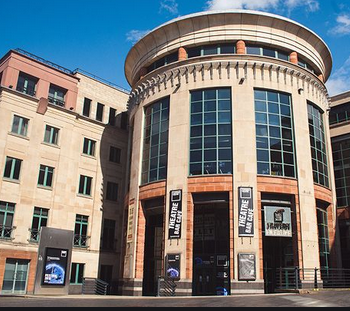
Edinburgh’s Traverse was founded in 1963 as a theatre club in a former dosshouse and brothel on Lawnmarket, before moving to a ramshackle venue off the Grassmarket in 1969, where I first encountered it as an Edinburgh Festival Fringe theatregoer in the early 1980s.
In 1992, the Traverse moved to new, subterranean premises in the basement of an office building in Cambridge Street, off the Lothian Road, as part of a cultural quarter in which it adjoins the city’s main concert venue the Usher Hall and the Royal Lyceum, with the Filmhouse repertory cinema complex across the street.
As a producing theatre, it contributes its own productions alongside importing visiting companies from elsewhere during the Edinburgh Festival every August; and unlike the rest of the free-for-all fringe, it has long maintained a more distinctive place as a properly curated festival within the festival.
It has long become the epicentre of the “serious” fringe — some distance away from the comedy, cabaret and student theatre that dominates at other venues. As Lyn Gardner, a former theatre critic for The Guardian who was long one of the most central voices of the Edinburgh Fringe thanks to her utter dedication and the sheer leg-work she puts into covering it, has called it the backbone of the Fringe programme: “What you see there will often set the tone and tenor of the rest of the Fringe.”
I’ve not been to the fringe for a number of years now; but I know when I do that this will be first theatre I need to re-visit, especially to see new plays by such Scottish voices as John Byrne, Gregory Burke, David Harrower, Liz Lochhead and David Greig (the latter of whom is now also the artistic director of the Royal Lyceum Theatre next door).
CONTACTS
https://www.traverse.co.uk/
Address: 10 Cambridge Street, Edinburgh EH1 2EDTwitter: @traversetheatre
7 Theatr Clwyd, Mold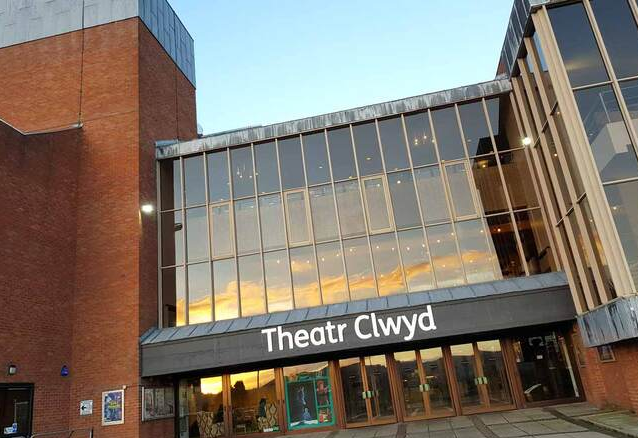
One of the UK’s most unexpected theatres, in terms of finding it amongst farmland in the middle of the countryside in North East Wales, Theatr Clwyd opened in 1976. But despite its apparent remoteness, it has become a cultural hub and focus not just for Wales but a beacon of cultural inclusivity and community work.
This has been demonstrated most keenly during its initiatives across the pandemic, when normal theatre operations were forced to shut. But the theatre didn’t remain idle, producing digital work, and continuing to engage with its audience both artistically and practically.
When it won The Stage Award for regional theatre of the year in January, I quoted artistic director Tamara Harvey and executive director Liam Evans-Ford saying, “It’s been a deeply challenging year across the sector. At a time when we’ve not been able to sell tickets or tell stories on our stages, we have tried to use our skills to help people in our local community and our wider artistic community. We’ve always known that our team was pretty amazing but this year have proved it beyond any imagining, and this is all about them.”
The Stage’s own citation said, “In 2020, Theatr Clwyd has been more than a theatre: it has been a beacon, one that won the hearts and trust of the many communities it serves,” as the theatre became a blood-donation centre, offered support to freelance artists, and held an outdoor season of performances, as well as producing online streaming content.

It’s fast become an regional theatre with national impact, demonstrated when Laura Wade’s comedy Home I’m Darling premiered here in 2018, before transferring to the National Theatre and then the West End in a production, directed by Harvey, that starred Katherine Parkinson and went on to win the 2019 Olivier Award for Best New Comedy.
Just across the English border — and the nearest railway station to it — is the ancient cathedral city of Chester, which also happens to have one of Britain’s newest and most intriguing theatre venues, the Storyhouse. Situated in the shell of a former Odeon cinema, but massively expanded and changed, it is also the city’s major local library, with books on display throughout its concourse. It contains both a bespoke theatre and cinema, as well as a restaurant.
CONTACTS
Theatr Clwyd: https://www.theatrclwyd.com/
Box Office: 01352 344101
Address: Raikes Lane, Mold, CH7 1YA
Twitter: @ClwydTweets
Storyhouse, Chester: https://www.storyhouse.com
Box Office: 01244 409 113
Address: Hunter Street, Chester, CH1 2AR
Twitter: @StoryhouseLive
8 Newbury’s Watermill Theatre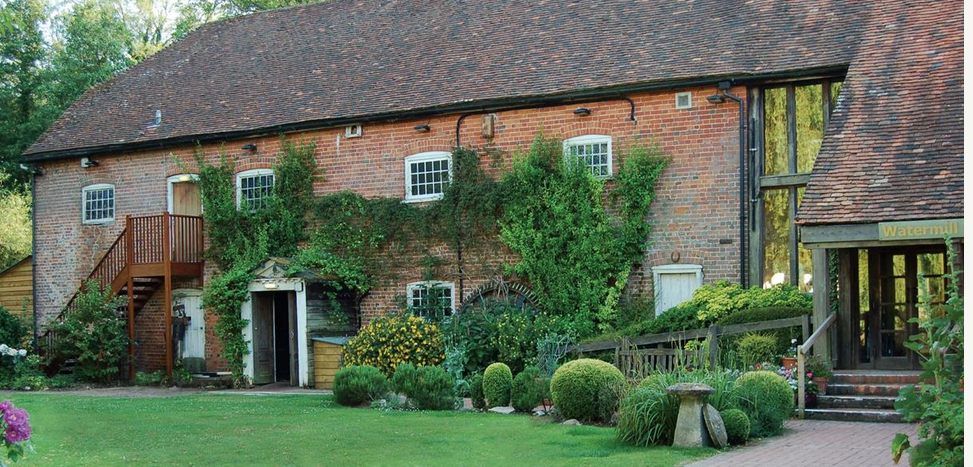
One of the most enchantingly-set theatres in Britain, the tiny Watermill Theatre, located in a converted watermill in the Berkshire countryside, has also been at the forefront of several creative initiatives that have led it all the way to the West End and Broadway. It was here that director Edward Hall first established his all-male Propeller Theatre Company that subsequently took its production of The War of the Roses (an adaptation of Shakespeare’s history plays that was first directed for the RSC by his father Sir Peter Hall) to the West End; it was also here that director John Doyle first did his actor-musician production of Sondheim’s Sweeney Todd that subsequently transferred to the West End and then to Broadway.
Doyle’s actor-muso productions here subsequently also included Mack and Mabel that also transferred to the West End and another Sondheim masterpiece Merrily We Roll Along, while other directors like Craig Revel Horwood have done similar work with Lloyd Webber’s Sunset Boulevard (2008) and the British musical Spend Spend Spend! (2010).
My favourite show here, however, was a revival of Alan Ayckbourn’s two part House and Garden in 2017, directed by Elizabeth Newman (now artistic director of Pitlochry Festival Theatre, see below). As I wrote in my review for The Stage at the time,
“Newbury’s Watermill, located in a 200-year-old countryside mill barn and gardens beside a stream, is one of Britain’s most bucolic theatrical addresses.
It’s the perfect home for one of Alan Ayckbourn’s most audacious theatrical games: two entirely separate but overlapping plays, performed in real time alongside one another by the same cast to two different audiences in adjoining locations.
At its London premiere in 2000, it played simultaneously in the National Theatre’s Olivier and Lyttelton. Now it has been remade as a site-specific production, with House playing inside the theatre and Garden playing outdoors beside it to an audience seated in two temporary covered stands.
When characters hide in the bushes, there’s no need for props: the bushes are real, and this adds to the hilarity and heartbreak of the play.”
Last summer, with indoor theatre shut by the pandemic, I saw another show in the garden: a concert version of Lerner and Loewe’s Camelot. And though I usually find this Lerner and Loewe musical utterly resistible — thanks to its mumblingly dull book — artistic director Paul Hart turned it into a scintillatingly festive occasion, with King Arthur and his cuckolding queen Guenevere played by the real-life husband and wife team of Michael Jibson and Caroline Sheen.
CONTACTS
https://www.watermill.org.uk/
Box Office: 01635 46044
Address: Bagnor, Newbury RG20 8AE
Twitter: @WatermillTh
9 Kilworth House, North Kilworth, Leicestershire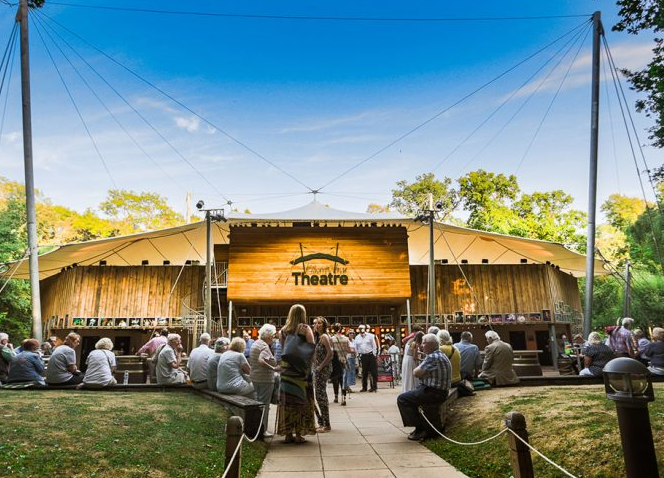
Set in the grounds of a country house hotel in Leicestershire, Kilworth House Theatre is a glorious passion project of the hotel’s owner Celia Mackay, who employs professional West End creatives and casts to stage summer musicals in an outdoor (but covered) garden setting, created within a wooded glade. Seating some 540 people underneath a white canopied tent, it’s what I imagine American summer stock theatre to be.
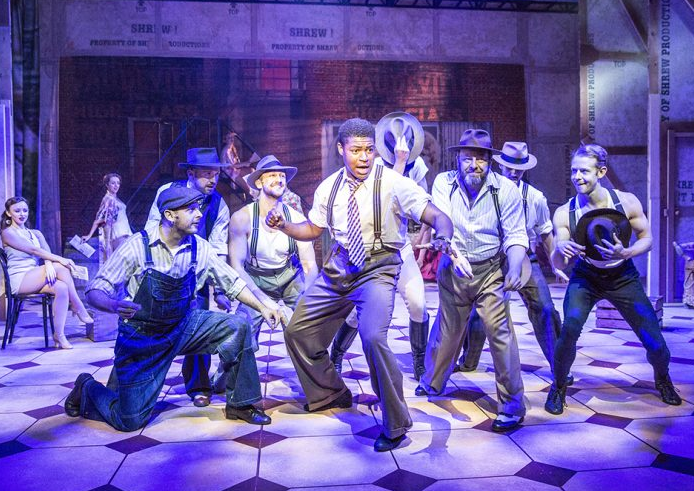
The titles are familiar crowd-pleasers — this year they were due to be Carousel and Half a Sixpence, but these have been postponed to 2022 now. I’ve been three times now — to see their productions of Kiss Me, Kate (pictured immediately above) and Top Hat (both in 2017) and Guys and Dolls (pictured at the top of this feature) in 2018 — and it’s now one of my favourite theatres in the country!
Another passion-project theatre that I have to do a shout-out for is Cirencester’s Barn Theatre, established in a former 1940s army Nissen hut by a local businessman Ian Carling and his wife Chrissie to create a legacy in the arts for the local community and the Cotswolds. Iwan Lewis, a working young West End actor in musicals like Les Miseables, Legally Blonde and Passion, was appointed artistic director, and quickly put the theatre on the map with productions like a revival of the musical The Secret Garden and the Sondheim revue Marry Me A Little.
During the pandemic, it has emerged at the forefront of efforts to continue reaching and entertaining audiences digitally.
CONTACTS
Kilworth House Theatre
https://www.kilworthhousetheatre.co.uk/
Box Office: 01858 881939
Address: Lutterworth Road, North Kilworth, Leicestershire LE17 6JE
Twitter: @KHTheatre
Barn Theatre
https://barntheatre.org.uk/
Box Office: 01285 648255Address: 5 Beeches Road, Cirencester, Gloucestershire, GL7 1BN
Twitter: @theBarnTheatre
10 Minack Theatre, Cornwall
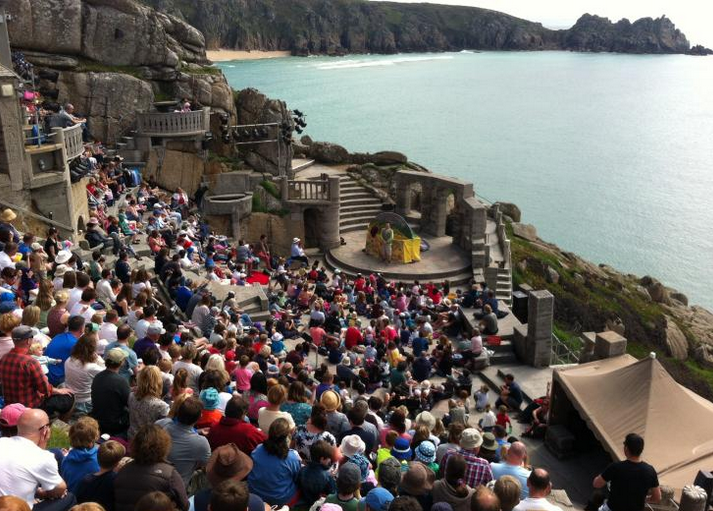
Few theatres in the world could claim to have quite as dramatic a backdrop as the Minack, which looks out over the Atlantic ocean from the tip of Cornwall, four miles from its most south-westerly point at Land’s End.
Established on this site in 1932 by Rowena Cade, who owned the land it sits on, its first production was Shakespeare’s The Tempest. It is mainly used by amateur and student companies — my only visit to date was to see the Cambridge University Gilbert and Sullivan Society present one of their operettas that a friend at the time was starring in — but last year during the shutdown of indoor theatres it came into its own, taking in a professional touring production of Educating Rita and originating a new production of Jason Robert Brown’s The Last Five Years. I can’t wait to revisit it.
The same is also true of two more beautifully set theatres that I’ve also only been to once each before. Pitlochry Festival Theatre — originally created in a tent in 1951 but since 1981 located in a purpose-built building — offers a repertoire of productions every summer that enables visitors to see multiple productions over a short stay — as the season grows, it eventually becomes possible to see six plays in six nights (or fewer if matinees are included). My sole visit to date, in the mid 1980s, was memorable for needing to see an emergency dentist after a sleepless night in pain, and saw him extracting a wisdom tooth for a fee that I remember was about £10!
Meanwhile, the Theatre by the Lake, located in the gorgeous Lake District on the shores of Derwentwater in Cumbria, also offers an annual season of six plays in rep, and I also long for a longer visit to so I can see an entire season.
CONTACTS
Minack Theatre
https://www.minack.com/minack-theatre
Box Office: 01736 810181
Address: Porthcurno, Penzance, Cornwall. TR19 6JU
Twitter: @minacktheatre
Pitlochry Festival Theatre
https://pitlochryfestivaltheatre.com/
Box Office: 01796 484626
Address: Port Na Craig, Pitlochry, PH16 5DR
Twitter: @PITLOCHRYft
Theatre by the Lake
https://www.theatrebythelake.com/
Box Office: 017687 74411
Address: Lakeside, Keswick CA12 5DJ
Twitter: @tbtlake
NEXT WEEK
After looking at my favourite regional theatres here today, I’m going to continue celebrate theatres themselves by turning my attention to my favourite theatres in London beyond the West End. (I’ve previously spoken and written about my favourite West End theatres here).
AND FINALLY:
Special thanks to my producer Paul Branch; Howard Goodall, for theme music; and Thomas Mann for the logo design

